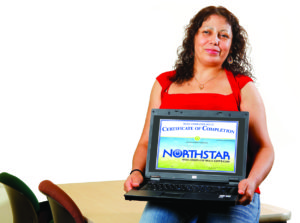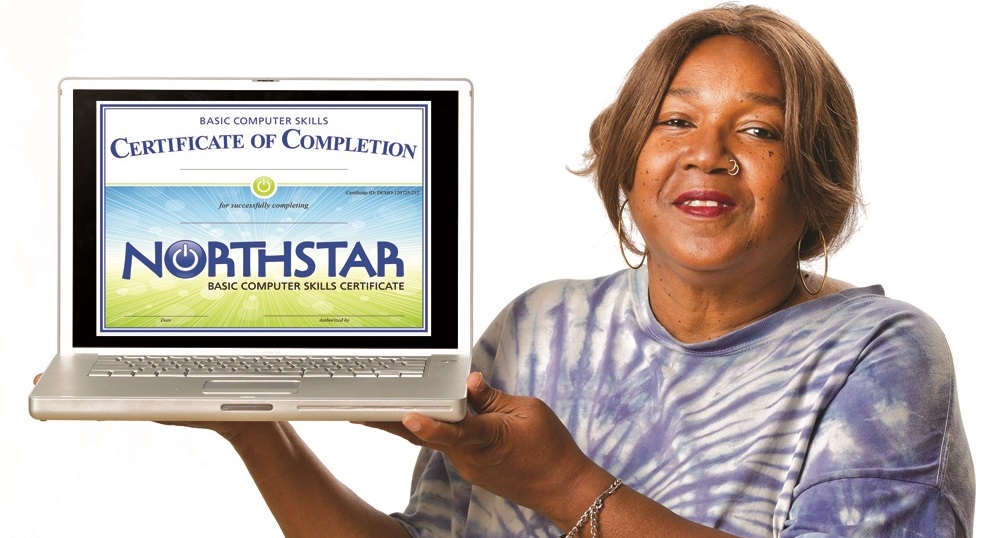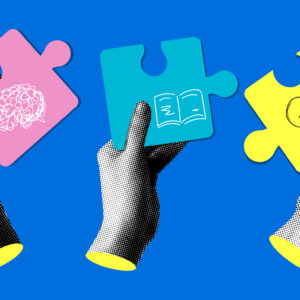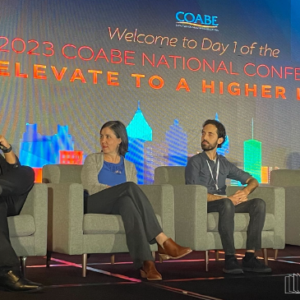The online Northstar Digital Literacy Assessment has helped over 2 million adults identify the gaps in their digital skills and gain recognition for their strengths. In this tech tip, adult educator JennaRose Dahl shares how she uses Northstar with her learners.
“If you don’t pass, you’ll get a results page that shows what skills you need to work on. If you do pass, you’ll get a certificate, so you can prove to employers that you have the skills.”
This is what I say about the Northstar Digital Literacy Assessment (NDLA) when I’m recruiting new learners for my computer training at a Goodwill site where adults who are unemployed or recently released from corrections come in to learn computer skills. I use the assessments for recruitment, pretests, and to offer valuable certificates to my learners. I also use the results page of the assessment to guide tutors as they help learners study.
Recruitment: You might not have considered using the NDLA as a recruitment tool, but let me tell you, everyone loves certificates. It’s easy to sell the benefit of computer training to those who lack confidence on computers, but it can be harder to recruit those who have moderate skills, with some gaps. A quick way to get their attention, and attendance, is to say, “That’s great you already have computer skills! That means you’ll be able to pass most of these assessments, and get certificates, which you can add to your resumé.” If it turns out they were overconfident in their skills, then you’ve got a new student!
Pretest: When I give new learners an orientation to my class, I give them the first assessment, Basic Computer Skills. If they pass, I move them on to the next assessment, to test their internet skills, because I want to see where they get stuck. I continue this process until I find an area they truly need work in, because my learners come in with varying levels of computer skills and I want to meet them where they’re at.
Once we figure out which area they need work on, I print their results page, give them an orientation to online learning, and set them up with one-on-one tutoring. There are loads of different self-paced online learning options available, including Learner Web, the St. Paul Public Library guide, and GCF Learn Free. My volunteer tutors, typically retired folks, work with the learner individually, using a combination of the online learning, hands-on practice, and focus on the areas the NDLA identified as needing improvement. I float around and assist learners as they study online, providing guidance and support.
 Certificates: In my class, we don’t have a fancy color printer, but I do buy cardstock to print the certificates on, and learners get satisfaction with each certificate they get. Once they get one, they tend to want a full set, which helps keep my class active. I’ve seen learners frame them, put them on their fridge, and show them off to friends, in addition to adding them to their resumés.
Certificates: In my class, we don’t have a fancy color printer, but I do buy cardstock to print the certificates on, and learners get satisfaction with each certificate they get. Once they get one, they tend to want a full set, which helps keep my class active. I’ve seen learners frame them, put them on their fridge, and show them off to friends, in addition to adding them to their resumés.
The way I use the assessments is very self-paced and individualized, but there are many different ways to use the assessments! Teachers might lead a month or more of computer training for each module before testing their learners, all together in a group. You can use the NDLA standards to create your own lesson plans, or include computer skills in plans you’ve already created. Employers sometimes use the assessments for new hires, to determine what training they’ll need for the job. You can choose to use all of them, or to focus in on the areas most relevant to your learners. The NDLA is used in many different settings, and the reach of the certificates is growing– you can now get certificates from Ontario to Australia.
To get started go to https://www.digitalliteracyassessment.org/ where you can learn more about Northstar and try out the modules yourself. If you’re already using NDLA, share your approach with us in the comments.
JennaRose Dahl is the Distance Learning and Digital Literacy Instructor for the Minnesota Literacy Council. She’s been working in the field of adult education and online learning since 2007, and started teaching English language learners in blended learning classrooms after being certified to teach adult ESL in 2016. She also runs a computer training center for adults who are unemployed or on reentry from corrections and need to gain computers skills. She provides helpdesk and writing support for the Northstar Digital Literacy Assessment, which she uses in her computer training center.
With funding from Walmart, the EdTech Center @ World Education is leading field testing in partnership with the Employment Technology Fund of new modules of the Northstar Digital Literacy Assessment. Watch our newsletter for updates.




